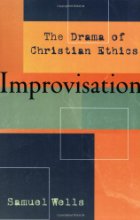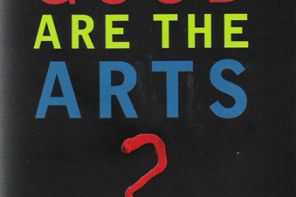Because I am researching theatrical improvisation as a model for Christian living, I often get questions about improv from people who are skeptical that it provides an apt model. In my experience, however, the issues people have with improv are usually due to misunderstandings about how improv actually works. Samuel Wells dealt with several of these misunderstandings in Improvisation: The Drama of Christian Ethics, which I would like to reiterate and then add a few observations of my own. Wells highlights the following misunderstandings:
 1. Improv is about being original. In reality, improvisation is more a matter of doing what comes naturally than being original. Wells explains that improvisation in the Christian life is about “being obvious”, being guided by one’s worship-formed, Scripture-saturated imagination rather than trying to be original.
1. Improv is about being original. In reality, improvisation is more a matter of doing what comes naturally than being original. Wells explains that improvisation in the Christian life is about “being obvious”, being guided by one’s worship-formed, Scripture-saturated imagination rather than trying to be original.
2. Improv is about being witty and clever. Actually, improvisation is more about contributing to the group than standing out with individual talent. It is about communal trust and respect, and being able to respond to and interact with others out of a state of relaxed awareness. Similarly, the point of Christian living is not to be a solitary and witty hero, but to join in the community of actors and play the roles we are given.
3. Improv is dangerous because of the room it gives for the unconscious. The unconscious, though affected by sin and potentially demonic, has been neglected in accounts of the moral life. The unconscious is a gift, a gift that God can forgive and heal.
4. Improv is too trivial and self-indulgent. On the one hand, this misses the point that improvisation is not just about creating laughter, but involves all human emotions. On the flip side, it rests on the assumption that ethics is serious business with no room for playfulness. While ethics is certainly not trivial or self-indulgent, Wells explains, it does have room for play and even humour, especially because “the joke is God’s and the laughter is divine” (Improvisation, 69).
In addition to these misconceptions that spoil the potential of improvisation as a model for Christian living, here are a few more that I have pinpointed:
5. Improv is about freedom without constraints. In reality, skillful improvisers are the ones who are attuned to the development of the story in order to act in ways fitting to a situation. There is not absolute freedom, but the liberating constraints of being part of a story. It is true, however, that whereas improvisers may exalt in an absolutely undetermined future, Christians hope in a God who is faithful to accomplish what he has promised: transformation of the world into a new creation. Utilizing improvisation as a model for Christian living, therefore, will have to take into account a specific kind of improvisation that allows for the liberating constraints of a providential past and prophetically-promised future.
6. Improv will promote hypocritical role-playing. As many theatrical improvisers will explain, the best moments of improvisation happen when you are not trying to be fake or put on a certain role, but when who you are merges with the role you are playing. Consequently, Christian living is not a matter of pretending to be Christians but becoming who we really are in Christ.
7. Improv is elitist, only for those with particular gifts. If Christian living is about improvisation, one may surmise, then I am doomed, because I could not act if my life depended on it! But Viola Spolin, another director of improv, reassures us: “Everyone can act. Everyone can improvise.”[1] Why? Because improvisation models after life itself, which is performed without the luxury of a script. Our lives are unscripted, and yet we make decisions based on habit, instinct, common sense, and creativity. Improvisation is not for those with a gift for acting; improvisation is for everyone.
In sum, if one studies in more detail the actual practice of theatrical improvisation, many of the objections for utilizing improv as a model for Christian living dissipate. Even though all models and metaphors break down at points, I think theatrical improvisation provides a unique model that provides new insights into how to live faithfully despite not having a script determining our every word and action on the world stage.
[1] Viola Spolin, Improvisation for Theater, 3rd ed. (Evanston: Northwestern University Press, 1999), 3.





This is the first I have seen a work directly connecting improvisation with practical theology. Thanks for your thoughts and break-down of the author’s salient points. I will add this book to my reading list.
I think you will really enjoy the book, and you will also find connection between improvisation and practical theology in The Drama of Doctrine by Kevin Vanhoozer and on a more popular level in The Bible as Improv by Ron Martoia. On the side of music improvisation, you might find helpful Jeremy Begbie’s Theology, Music and Time and on a more popular level Finding the Groove by Robert Gelinas. I hope that’s helpful!
This is great, Wes. Well done. A funny coincidence is that I’m doing an independent study with Sam this term and our first assigned book is this very one. We’ll be looking at virtue ethics in general. My particular research will look at the role of virtue ethics in relation to the liturgical arts. We’ll see what comes of it. But it was fun to see your post here. I’ll also look forward to seeing the results of your research.
Oh, by the way, I’d love to ask a question of the whole lot of you. I’m not sure how to do that, so I’ll simply do it here. If you could kindly ask your peeps to take a look at it, I’d be very obliged.
I’m looking for stories where art was offered in excessively generous manner (a la Babette’s Feast) to an audience who could not necessarily repay the gift. It could be public art. It could be art offered in a destitute part of the world–urban or rural. It could be Yo-Yo Ma playing his cello for a kid dying in the cancer ward. Anything along those lines. If you guys have any good stories up your sleeve, I’d love to hear them. Many thanks in advance. (You could email me if you wish, using the email I’ve plugged in to your website.)
Your research sounds fascinating, David, and we’ll definitely have to compare some notes!
I will make sure everyone sees your request and encourage them to respond here if they have any ideas. Nothing comes to mind immediately, but I am sure there are examples so hopefully we can unearth some.
Thanks again for your interaction!
David,
Did you see the Washington Post article from a few years ago when world-class violinist Joshua Bell played in a D.C. metro station at rush hour for 45 minutes, and only 1 or 2 people recognized him, or even stopped to listen?
Link: http://www.washingtonpost.com/wp-dyn/content/article/2007/04/04/AR2007040401721.html
Hope it’s going well in NC!
Dear all –
Robert Dykstra of Princeton Seminary has written a very thoughtful article on improvisation, creativity and pastoral practice, that riffs off of the Joshua Bell incident. When Robert gave this as a talk to the Association of Practical Theology meeting at PTS in the Spring of this year, some of the audience were moved to tears!
Dykstra, Robert C. “Unrepressing the Kingdom: Pastoral Theology as Aesthetic Imagination.” Pastoral Psychology (19 January 2012): 1-19.